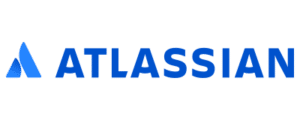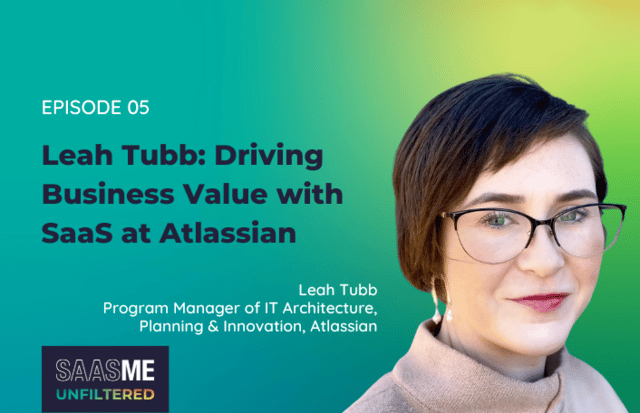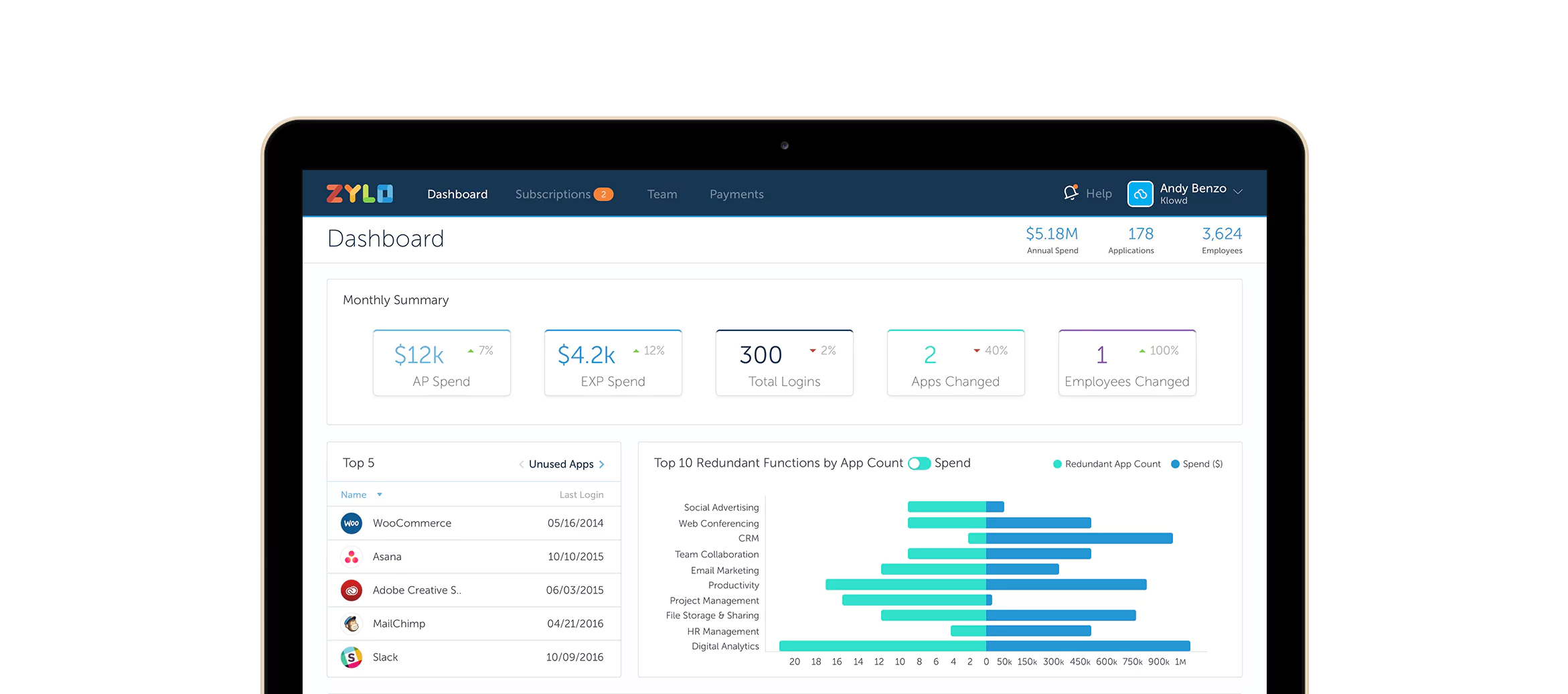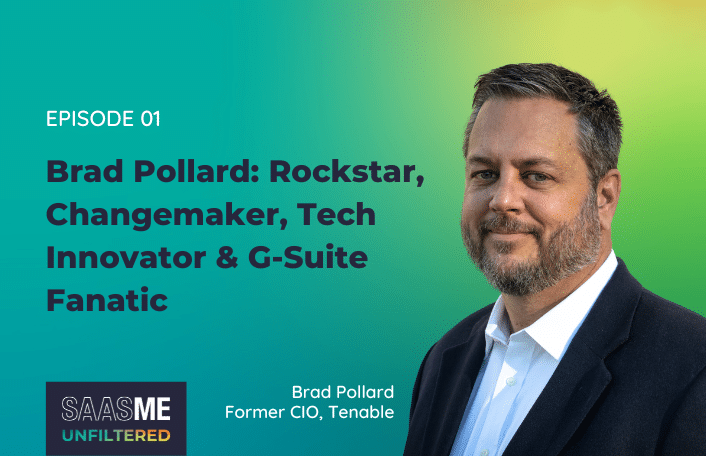
Atlassian Reinforces Enterprise Architecture with Zylo SaaS Management
Learn how Atlassian’s enterprise architecture uses Zylo to encourage innovation and rapid growth while constantly rationalizing their application portfolio.
Back
Back
Search for Keywords...
Blog

Table of Contents
Trying to wrangle SaaS as your organization scales requires a delicate balance enabling choice while still ensuring governance. Leah Tubb, Program Manager of IT Architecture, Planning and Innovation, shares her approach to peeling back the layers of SaaS at Atlassian and fostering better partnership between IT and the business to ultimately drive business value.
Listen to the full episode on Spotify and Apple Podcasts.
When Atlassian’s Leah Tubb embarked on her journey to manage SaaS, little did she know that she and her colleagues would be biting into an onion.
“I thought we could answer that pretty easily but then, as we started to look into it … It just kept going and going and going and each of those were a layer that we were trying to figure out.”
But as Atlassian continues to scale, Leah details how her team has tackled the management of SaaS and developing operational, programmatic rhythms rooted in security, contracts, and visibility.
By partnering with Atlassian’s Enterprise Architecture team, Leah ensures every decision about a SaaS application is rooted in business capabilities and drives value back to the business. Altogether, this creates a harmonious partnership with IT and the business, enabling Atlassian’s continued growth.
Name: Leah Tubb
What she does: Program Manager of IT Architecture, Planning and Innovation at Atlassian
Connect with Leah online: LinkedIn
“The reason that this all started and came about was our CIO asked, ‘What’s our SaaS portfolio?’ And I thought we could answer that pretty easily but then, as we started to look into it, we started to say, ‘Well, how many applications do we have? We think we know, roughly, at least what we have going through AP and expense. And then, what’s the compliance for all of those? Who has access to all of these different gateways and for all of the applications? What’s the risk associated with their data? Are they meeting their contractual SLAs? What’s the spend, what’s the usage, what’s the contract?’ It just kept going and going and going and each of those were a layer that we were trying to figure out.”
“We root everything in business capabilities. We want to know – whether it’s people, process, technology or information – how it aligns to business capabilities, because then we know exactly what it’s doing for us and how we are driving business value for Atlassian. How things come together, where do we have redundancy where redundancy is good and where do we have redundancy where we can start doing rationalization? Let’s have a discussion as to are those the right ones, are they actually serving the needs that they need to serve or what can we do better? And then you’re driving that partnership between business and IT and, for us, that’s the real core of why we’re here.”
“We’ve finally reached a point where we know what steps need to be done on a regular basis, and that’s what we call our operational rhythm. We go through what’s coming in, what’s going out. We look at payments in Zylo, we look at what we’re discovering in our internal SAML tool. What do we know the business wants to deprecate and what can we, maybe, merge with another tool? Spend generally drives our prioritization just for the sheer fact of, if an application has spend attached to it, it generally had to go through some acceptance from leadership to be approved and then it also says, generally, how much it’s connected to the rest of our platforms. All these things promote collaboration with the business.”
“My focus is different from my procurement team’s focus and it’s different from my workplace tech team’s focus and it’s different from my HR team’s focus. And so, we really wanted to be able to get reports and information out of our SaaS management tool that could fit all of those different personas and Zylo’s reporting kicked ass. Our ask from our SaaS management tool is different from whatever persona you’re focused on. Zylo enables me to get my information out in a way that I want my information out.”
“We are really big on shadow IT acceptance here at Atlassian, and IT does not want to be a bottleneck. If you say you need a tool to make your job easier, you can get it and you can ask for IT to help you get it, or you can get it yourself and put it on your computer. And, when it comes down to connecting that tool with other tools, that’s where you’ll have some limitations. And so, we want to know that those items that are shadow IT are going through the same governance process than if they weren’t shadow IT just to make sure that they’re safe and we have the security done correctly.”
“Our vision for IT is powering IT and Atlassian towards the future of modern work. We see that folks are going to be working in different ways, asynchronously, the way that they want to work. The tool that Cory and Ashley are in might be different than mine, but how can we connect those tools? That way, we’re still seeing and singing from the same sheet of music as we try to deliver a product. So, we really want to make sure that we have flexibility with our tools but we can also enable folks to work the way that they need to work. So, it’s all about scale and making sure that we can get the right data out to make sure that we’re protecting Atlassian data at the end of the day.”
10:12 – “You’re driving that partnership between business and IT – and for us, that’s the real core of why we’re here.”
10:42 – “Maximizing business value is number one and how we’re doing that is really looking at security. We want to make sure we understand where all of Atlassian data is. We want to make sure how it’s accessed and that the company that we’re sharing it with has the right controls in place.”
26:45 – “Biggest hurdle has been bringing all of the data together, but that’s also opened us up to a big opportunity of how we can use Insight to make our jobs easier.”
Peeling the SaaS Onion with Atlassian IT
Paprika (recipe manager app)
Jira Service Management
Tehran on Apple TV+
Author Andrew Mayne
Listen and subscribe to SaaSMe Unfiltered wherever you listen to podcasts.
ABOUT THE AUTHOR

Cory Wheeler
As Zylo’s Chief Customer Officer, Cory is responsible for helping our customers drive ROI and SaaS Management success with Zylo. He helps companies of all sizes effectively discover, optimize, and govern their SaaS through Zylo’s platform and services. Prior to founding Zylo, Cory spent 15 years in finance and procurement, managing categories and sourcing teams at Arthur Andersen, BearingPoint, and both Takeda and Astellas Pharmaceuticals. He built the procurement organization at ExactTarget, and managed the integration with the Salesforce Marketing Cloud procurement organization in 2015. He and his family reside in Indianapolis, IN, where they can be found cheering for the Purdue Boilermakers and Chicago Cubs.

Learn how Atlassian’s enterprise architecture uses Zylo to encourage innovation and rapid growth while constantly rationalizing their application portfolio.

Table of Contents ToggleEmployee-Led SaaS Purchases Are Both a Source of...

Table of Contents ToggleGoing Beyond SaaS Application Visibility Drives Actionable DataActive...

Table of Contents ToggleEpisode SummaryGuest SpotlightEpisode HighlightsCIOs Play an Important Role...
| Cookie | Duration | Description |
|---|---|---|
| cookielawinfo-checkbox-analytics | 11 months | This cookie is set by GDPR Cookie Consent plugin. The cookie is used to store the user consent for the cookies in the category "Analytics". |
| cookielawinfo-checkbox-functional | 11 months | The cookie is set by GDPR cookie consent to record the user consent for the cookies in the category "Functional". |
| cookielawinfo-checkbox-necessary | 11 months | This cookie is set by GDPR Cookie Consent plugin. The cookies is used to store the user consent for the cookies in the category "Necessary". |
| cookielawinfo-checkbox-others | 11 months | This cookie is set by GDPR Cookie Consent plugin. The cookie is used to store the user consent for the cookies in the category "Other. |
| cookielawinfo-checkbox-performance | 11 months | This cookie is set by GDPR Cookie Consent plugin. The cookie is used to store the user consent for the cookies in the category "Performance". |
| viewed_cookie_policy | 11 months | The cookie is set by the GDPR Cookie Consent plugin and is used to store whether or not user has consented to the use of cookies. It does not store any personal data. |